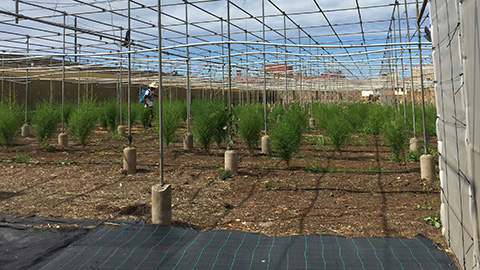Sequentia Biotech launches Biotech Tricopharming Research as a spin-out to commercialise Artennua, their first agropharma product

22/11/2018
Sequentia Biotech, based at UAB Research Park, has launched the spin-out Biotech Tricopharming Research S.L. to produce and commercialize Artennua, their first agropharma product. The spin-out derives from their R&D department, which used Tricopharming technology, or agricultural biopharming applied to plant trichomes, to produce and commercialize therapeutically valuable molecules.
Plant trichomes or 'hairs' produce these molecules naturally, but usually in very small quantities. Sequentia started its research activities by applying Tricopharming to Artemisia annua, a medicinal plant that produces artemisinin, the molecule recommended by the WHO to treat malaria.
In 2015, with help of the Torres Quevedo grant by Mineco, and following three years of efforts, Dr Luís Matías Hernández, then principal investigator at Sequentia, was able to improve the concentration of artemisinin in planta; the foliar biomass (therefore obtaining more trichomes to produce artemisinin); and the annual production of the plant using completely natural and sustainable methods. These results were extremely promising and important because the demand for Artemisia annua continues to increase year on year while problems in its production means that often the demand is not being met. Sequentia called this optimized plant Artepharming and later changed it to Artennua.
After receiving the CDTI grant within the NEOTEC program by the Spanish government, pilot production was carried out during 2017-2018 and cultivation of the plant has now started in the Canary Islands, hence the decision to create a new entity for the commercialization of Artennua, as well as other future products from their R&D activities.
Meanwhile, the business strategy was defined. "When we looked into the market applications of Artennua we realized the potential is enormous", explains Dr Matías Hernández, now CEO of the new Biotech Tricopharming Research. "There are hundreds of scientific studies and dozens of clinical trials showing promising results in many diseases, including several forms of cancer, inflammatory, gastrointestinal and autoimmune diseases, amongst others".
In fact, Artemisia annua was used for centuries in traditional Chinese medicine to treat the fevers caused by malaria before Tu Youyou, a Chinese researcher, won the Nobel prize in medicine in 2015 for proving its efficacy in this disease. "But Artemisia annua is also being used to treat leishmaniasis in dogs and due to its antioxidant, anti-age, anti-inflammatory and anti-microbial properties, Artemisia annua also has applications in other sectors such as natural cosmetics, dermatology and nutraceuticals", continues Dr Luis Hernández, "our mission is to create natural, healthy products at a fair price. The demand for the organic and sustainable is increasing, and we want to prove the potential of Artennua to meet this demand, using scientifically contrasted evidence, testing and quality controls. In fact, we are already in touch with several companies that are carrying out beta-testing with Artennua".